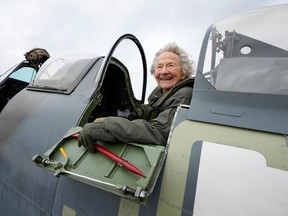Article content
At 99 years old, Dorothea Barron is revealing a wartime secret.
The Second World War veteran says she has no regrets about lying about her height to join the Women’s Royal Naval Service in 1943 at the age of 18.
Article content
Barron told Forces News that she placed cardboard inside her shoes and wore her hair up to meet the height requirement for the U.K. navy.
“I really shouldn’t have been in the services,” she said. “I was supposed to be 5’3”, and there is no way I was ever 5’3.””
Article content
Recommended from Editorial
Barron, who is being celebrated ahead of the 80th anniversary of D-Day and the Battle of Normandy on June 6, was stationed in Campbeltown in Argyll and Bute, Scotland. She and other members of the Women’s Royal Naval Service, or Wrens, monitored troops preparing for the beach landing phase of the battle.
Barron served as a visual signaller, mastering semaphore and Morse code to communicate messages between those at sea and those on land.
“We were keeping an eye on them and looking after them so if the boat suddenly developed a leak and they were sinking, we could then communicate it and they could get help,” she said.
Barron added that they weren’t aware they were preparing for the campaign that would eventually liberate German-occupied France and Western Europe from the Nazis.
“We didn’t know what we were doing because you didn’t ask a question, and you weren’t expected to divulge any information because you never knew who was listening,” she said.
Article content
On Tuesday, ahead of the D-Day anniversary, Barron was treated to an event at England’s Biggin Hill Heritage Hangar, where she was photographed in a Spitfire. The aircraft, built in 1943, bears a Canadian leaf and joined the Royal Canadian Air Force’s 441 Squadron on Sept. 25, 1944. Its first operational sortie was flown from an advanced landing ground in Belgium.

Today, Barron is still active and maintains her physical health by practising yoga. She even leads a class at her local village hall, teaching the discipline to people many years her junior.
Eight decades on, she remains proud of the work she and others did preparing the troops, and grateful she was accepted into the navy despite the white lie she had to tell.
“I think they took pity on me and thought ‘poor thing, she’s so keen to come we will let her in even if she isn’t 5’3”,” she said.
Her contributions were recognized in a letter from Admiral Sir Ben Key, the First Sea Lord.
“In hugely difficult circumstances, the work you and your fellow Wrens did was fundamental to the outcome of the war. You should be hugely proud of your contribution,” Key wrote.
“You were extraordinary trailblazers for all the women that now serve on the frontline in today’s navy — without your example and your courage, we would not be where we are today.”
Our website is the place for the latest breaking news, exclusive scoops, longreads and provocative commentary. Please bookmark nationalpost.com and sign up for our newsletters here.
Share this article in your social network






